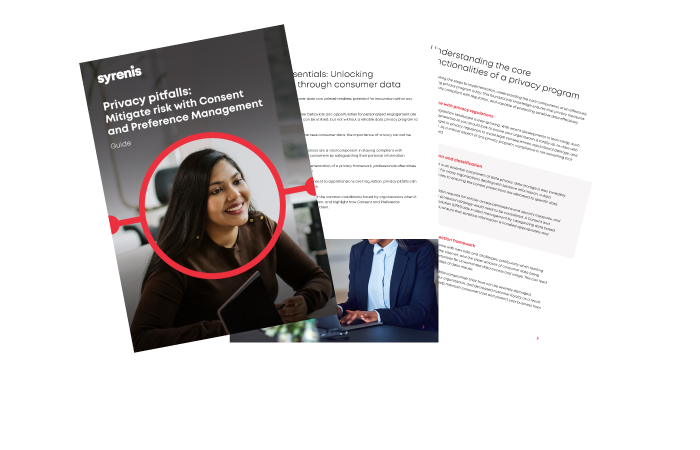As data privacy regulations continue to evolve and consumer expectations around transparency and control grow, organizations across all sectors must ensure their data governance strategies are robust, scalable, and compliant.
In 2025, the need for effective consent and preference management is more critical than ever.
At Syrenis, we work closely with compliance, marketing, and IT teams to help them navigate the complexities of data protection.
This guide outlines the essential features to consider when evaluating GDPR compliance software and highlights how our platform, Cassie, supports enterprise-grade consent and preference management.
The strategic importance of consent management
GDPR and similar global regulations require organisations to obtain, manage, and demonstrate valid consent for data processing activities. Beyond legal compliance, effective consent management builds trust, enhances customer experience, and enables ethical data-driven innovation.
A modern Consent and Preference Management Platform (CPMP) should not only meet regulatory requirements but also integrate seamlessly with your digital ecosystem.
Key capabilities to prioritize
When selecting GDPR compliance software, we recommend evaluating the following core capabilities:
1. Granular consent capture
The platform should support detailed consent options—by purpose, processing activity, communication channel, and data category—ensuring compliance with GDPR’s specificity and informed consent principles.
2. Real-time synchronization
Consent and preference updates must be reflected instantly across all systems, including CRM, marketing automation, and customer service platforms, to prevent unauthorised data use.
3. Comprehensive audit trails
Regulatory readiness requires immutable records of consent transactions. Look for platforms that provide timestamped logs, version histories, and exportable reports for audits and internal governance.
4. Omnichannel integration
Consent should be captured and managed consistently across websites, mobile apps, call centres, and in-person interactions. API-first platforms with flexible integration options are essential.
5. User-friendly interfaces
A transparent and intuitive user experience encourages engagement and trust. Ensure the platform offers customisable consent interfaces that align with your brand and accessibility standards.
6. Global regulatory support
For organisations operating across jurisdictions, the platform should support multiple regulatory frameworks (e.g., GDPR, CCPA, LGPD) with configurable rules and localization capabilities.
Why organizations choose Cassie by Syrenis
Cassie is Syrenis’ enterprise-grade consent and preference management platform, designed to meet the complex needs of modern organizations. Trusted by global brands and public sector bodies, Cassie offers:
- Highly configurable consent models: Adaptable to diverse business structures and regulatory requirements.
- Real-time data synchronization: Ensures consistent consent status across all integrated systems.
- Privacy by design architecture: Built to support GDPR, ePrivacy, and other global standards from the ground up.
- Scalability and security: Handles high volumes of data with robust security and performance.
- Advanced reporting and analytics: Enables compliance teams to monitor, audit, and optimise consent strategies.
Cassie empowers organizations to operationalise privacy, reduce compliance risk, and deliver personalized experiences with confidence.
Conclusion
As regulatory scrutiny intensifies and digital ecosystems become more complex, investing in the right GDPR compliance software is a strategic imperative. By prioritizing flexibility, transparency, and integration, organizations can ensure they remain compliant while building lasting trust with their customers.


